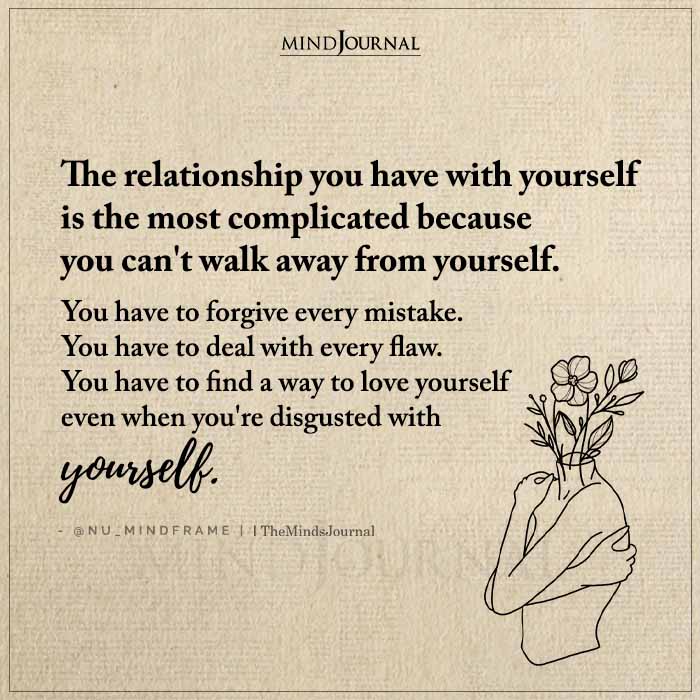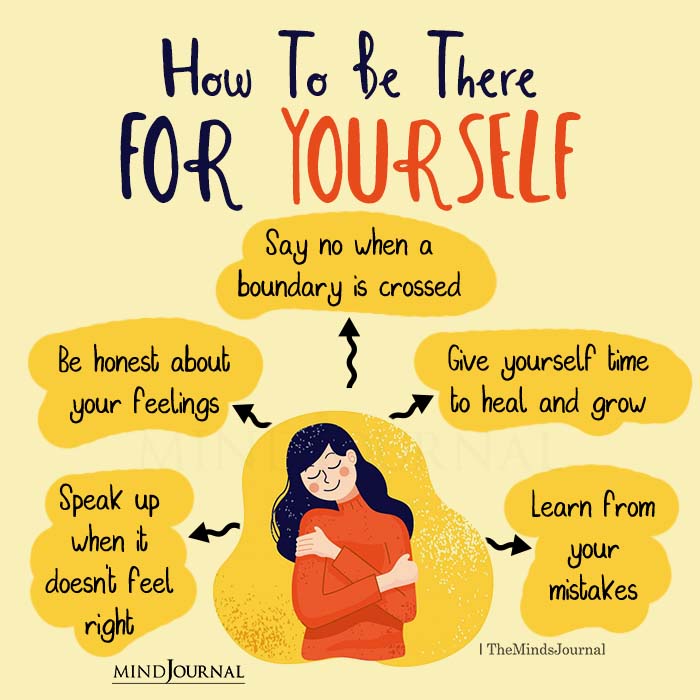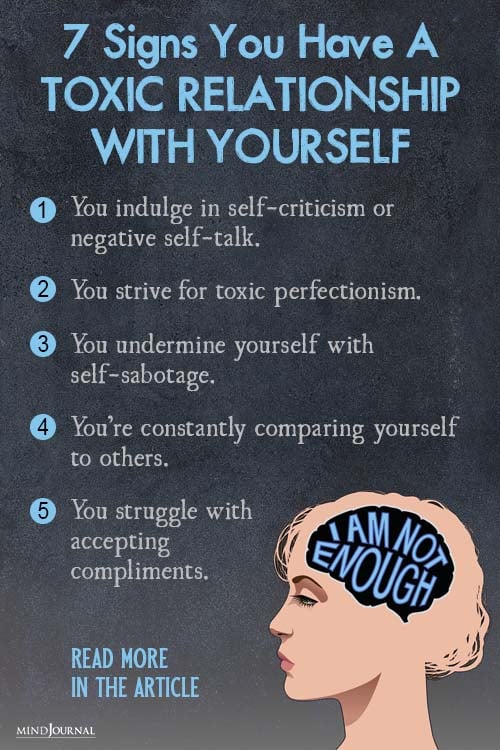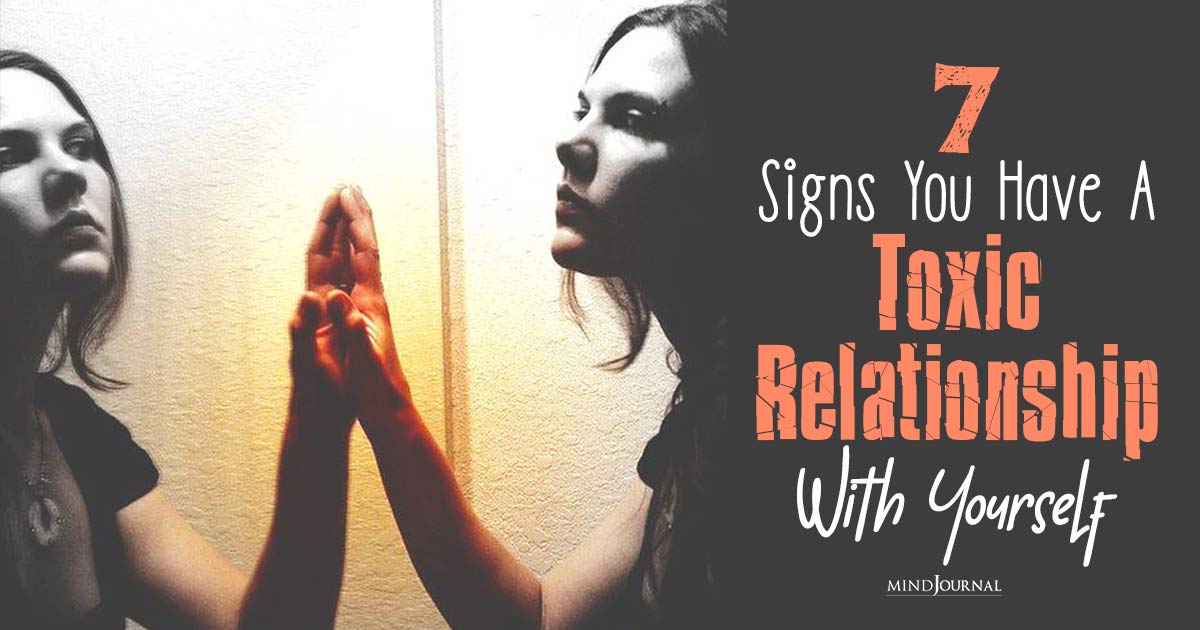Are you constantly at war with yourself, struggling to meet your own high standards? It’s time to face the music: you may be in a toxic relationship with yourself.
Learn to break free from this cycle of self-sabotage and start treating yourself with the love and compassion you deserve!
It’s easy to recognize the signs of a toxic relationship with someone else, but what about the relationship we have with ourselves?
Similar to toxic relationships with others, a toxic self relationship can lead to negative effects on your mental health and overall well-being.
It can be challenging to recognize the signs of a toxic relationship with oneself, as they are often subtle and insidious. But it’s time to face the truth and build a better relationship with your own self.

In this article, we will explore some common signs that may indicate you have a toxic relationship with yourself. By identifying these signs, you can begin to take steps towards healing and cultivating a more positive relationship with the most important person in your life – you.
Below are the seven signs you have a toxic relationship with yourself. These indicate if you’re constantly getting in the way of your own happiness.
Related: 12 Signs You Are Losing Yourself In Your Relationship
Can You Have A Toxic Relationship With Yourself?
Yes, it’s possible to be abusive to your own self, and below are the seven signs that indicate:
1. You indulge in self-criticism or negative self-talk.
Negative self-talk is the pattern of critical or pessimistic inner dialogue that people engage in with themselves. It involves making negative statements about one’s abilities, qualities, or actions.
Do you constantly put yourself down? Do you call yourself names or tell yourself that you’re not good enough? If so, you’re engaging in negative self-talk, which can be incredibly damaging to your mental health and self-esteem.
To combat negative self-talk, it’s important to identify and challenge these thoughts by reframing them in a more positive light.
2. You strive for toxic perfectionism
While striving for excellence can be a positive trait, perfectionism can become a problem when it leads to excessive self-criticism, anxiety, and unrealistic expectations.
Do you hold yourself to impossibly high standards? Do you beat yourself up when you make even the smallest mistake? If so, you’re a perfectionist, and this can lead to feelings of anxiety, self-doubt, and even depression.
It makes you focus on flaws and mistakes rather than successes and accomplishments, and a fear of failure or criticism.
To overcome perfectionism, it’s important to recognize that no one is perfect and that mistakes are a natural part of the learning process. When you set realistic goals and focus on progress rather than perfection, it can also be helpful.
3. You undermine yourself with self-sabotage.
Self-sabotage is the act of intentionally or unintentionally undermining one’s own goals, relationships, or well-being. It involves behaviors that are counterproductive or self-destructive and can lead to negative consequences, such as missed opportunities or damaged relationships.
Do you have a tendency to sabotage your own success? Do you procrastinate or make excuses when it comes to pursuing your goals? If so, you’re engaging in self-sabotage.
Self-sabotage can stem from a lack of self-esteem or confidence, fear of success, fear of failure, or unresolved emotional issues. To overcome this, it’s important to identify the underlying causes and work to address them.
Related: How To Stop Self Sabotage: 2 Proven Ways
4. You’re constantly comparing yourself to others
One of the signs of an unhealthy relationship with yourself is comparing oneself to others. This can lead to feelings of inadequacy, self-doubt, and low self-esteem. It can also undermine one’s ability to appreciate and value one’s unique qualities and achievements.

Are you always measuring yourself against others and feeling like you’re coming up short? This toxic habit can leave you feeling jealous, envious, and even resentful toward others. Say goodbye to the comparison trap and hello to a happier, more confident you!
Trade comparison for celebration! Instead of focusing on what others are doing, give yourself a high-five for your own achievements and qualities. Practicing gratitude and appreciation can boost your confidence.
5. You struggle with accepting compliments.
Difficulty accepting compliments is a common phenomenon that involves downplaying or dismissing compliments, feeling uncomfortable or embarrassed, or feeling like the compliment is undeserved.
Are you a pro at brushing off compliments or feeling like you don’t deserve them? It’s time to break up that toxic relationship with yourself! Embrace the good vibes and allow yourself to feel good about who you are. Don’t let your inner critic steal your spotlight!
Practice receiving compliments in a gracious and confident manner, and recognize that accepting praise does not necessarily mean arrogance or conceit.
6. You self-neglect or have difficulty saying ‘NO’
Self-neglect is a behavioral pattern that may involve ignoring physical or emotional pain, failing to practice self-care, or engaging in behaviors that are harmful to oneself.
Do you neglect your own needs and have a tough time saying “No”? Do you prioritize work or other obligations over self-care activities like exercise, sleep, or relaxation?

Saying “yes” to everything can lead to overcommitment, burnout, and resentment, as well as making it difficult to prioritize one’s own needs.
If you’re being toxic to yourself, not treating yourself with kindness and respect -prioritize yourself! Remember, self-love isn’t selfish – it’s necessary.
7. You’re not in tune with yourself, lacking self-awareness.
It refers to a lack of understanding or insight into one’s own thoughts, feelings, and behaviors. It can make it difficult to recognize patterns or issues in one’s life and can lead to a lack of direction or purpose.
Are you feeling like a passenger in your own emotional rollercoaster, unable to pinpoint what’s causing your negative self-talk or self-sabotaging behaviors? Sounds like you could use a healthy dose of self-awareness!
This superpower is essential for taking control of your life, identifying your triggers, and ultimately achieving personal growth and positive change. So, buckle up and start exploring your inner world. You might be astonished by the things you uncover!
Related: How To Improve Your Relationship With Yourself: 5 Ways
What A Healthy Relationship With Yourself Looks Like…
This is what a healthy relationship with yourself should look like:
- Self-acceptance: Embracing yourself entirely, including your imperfections and all the aspects that make you who you are.
- Positive self-talk: Speaking to yourself kindly and encouragingly, rather than putting yourself down.
- Self-care: Prioritizing your physical, mental, and emotional well-being and taking time to practice self-care activities.
- Forgiveness: Letting go of past mistakes and forgiving yourself for them.
- Setting boundaries: Knowing your limits and establishing boundaries to protect your physical and emotional health.
- Self-reflection: Reflecting on your thoughts, emotions, and behaviors to grow as a person.
- Self-trust: Trusting yourself to make the right decisions and choices for your life.
- Self-love: Loving yourself unconditionally and treating yourself with kindness and compassion.

Are you in a toxic relationship with yourself? If yes, then note that awareness is the first step towards making positive changes in your relationship with yourself.
Seek support from a therapist or trusted loved one if you need help working through your negative behaviors. Remember, you deserve to have a healthy and positive relationship with yourself, and with a little effort, you can make that a reality.












Leave a Reply